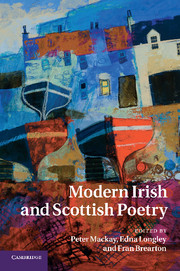Book contents
- Frontmatter
- Contents
- List of contributors
- Acknowledgements
- Introduction
- 1 Swordsmen: W. B. Yeats and Hugh MacDiarmid
- 2 Tradition and the individual editor: Professor Grierson, modernism and national poetics
- 3 Louis MacNeice among the islands
- 4 Townland, desert, cave: Irish and Scottish Second World War poetry
- 5 Affinities in time and space: reading the Gaelic poetry of Ireland and Scotland
- 6 Contemporary affinities
- 7 The Classics in modern Scottish and Irish poetry
- 8 Translating Beowulf: Edwin Morgan and Seamus Heaney
- 9 Reading in the gutters
- 10 ‘What matters is the yeast’: ‘foreignising’ Gaelic poetry
- 11 Outside English: Irish and Scottish poets in the East
- 12 Names for nameless things: the poetics of place names
- 13 Desire lines: mapping the city in contemporary Belfast and Glasgow poetry
- 14 ‘The ugly burds without wings’?: reactions to tradition since the 1960s
- 15 ‘And cannot say / and cannot say’: Richard Price, Randolph Healy and the dialogue of the deaf
- 16 On ‘The Friendship of Young Poets’: Douglas Dunn, Michael Longley and Derek Mahon
- 17 ‘No misprints in this work’: the poetic ‘translations’ of Medbh McGuckian and Frank Kuppner
- 18 Phoenix or dead crow? Irish and Scottish poetry magazines, 1945–2000
- 19 Outwith the Pale: Irish–Scottish studies as an act of translation
- Guide to further reading
- Index
- References
11 - Outside English: Irish and Scottish poets in the East
Published online by Cambridge University Press: 18 April 2011
- Frontmatter
- Contents
- List of contributors
- Acknowledgements
- Introduction
- 1 Swordsmen: W. B. Yeats and Hugh MacDiarmid
- 2 Tradition and the individual editor: Professor Grierson, modernism and national poetics
- 3 Louis MacNeice among the islands
- 4 Townland, desert, cave: Irish and Scottish Second World War poetry
- 5 Affinities in time and space: reading the Gaelic poetry of Ireland and Scotland
- 6 Contemporary affinities
- 7 The Classics in modern Scottish and Irish poetry
- 8 Translating Beowulf: Edwin Morgan and Seamus Heaney
- 9 Reading in the gutters
- 10 ‘What matters is the yeast’: ‘foreignising’ Gaelic poetry
- 11 Outside English: Irish and Scottish poets in the East
- 12 Names for nameless things: the poetics of place names
- 13 Desire lines: mapping the city in contemporary Belfast and Glasgow poetry
- 14 ‘The ugly burds without wings’?: reactions to tradition since the 1960s
- 15 ‘And cannot say / and cannot say’: Richard Price, Randolph Healy and the dialogue of the deaf
- 16 On ‘The Friendship of Young Poets’: Douglas Dunn, Michael Longley and Derek Mahon
- 17 ‘No misprints in this work’: the poetic ‘translations’ of Medbh McGuckian and Frank Kuppner
- 18 Phoenix or dead crow? Irish and Scottish poetry magazines, 1945–2000
- 19 Outwith the Pale: Irish–Scottish studies as an act of translation
- Guide to further reading
- Index
- References
Summary
THE IGNORANT IMAGINATION
Czechs have a saying: ‘Kolik řečí umíš, tolikrát jsi člověkem’ (‘You are as many times a person as the languages you know’). Certainly for the Czechs, it has always been necessary for cultural and physical survival to know more than their own language. For many centuries it was German, then Russian last century, and now English is the most popular second language in the country. Of course no one will tell you that it is a good thing to know only one language. Perhaps the main advantage of acquiring fluency in only one other language is that one begins to realise that not everything can be expressed in your mother tongue; not everything can even be translated into it. In the case of speakers of minority languages like, say, Czech or, closer to home, Irish, they are constantly and painfully reminded of this fact. Some monoglot Czechs are acutely aware that whole worlds of ideas and knowledge are closed off from them by their ignorance of English. But people whose mother tongue is English are in a different position. There is a kind of linguistic arrogance which presumes that if something cannot be translated well into English, then its existence remains at best vague and shadowy, with lip-service paid in such cases – English-speakers will politely fantasise about how it must sound in the original, Czech, Estonian, Chinese or Irish.
- Type
- Chapter
- Information
- Modern Irish and Scottish Poetry , pp. 191 - 203Publisher: Cambridge University PressPrint publication year: 2011

